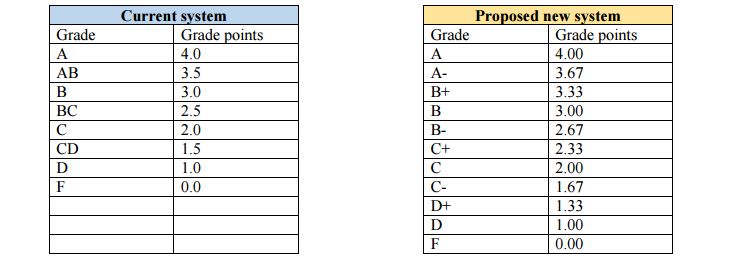A proposal to change the grading scale to utilize a ‘plus and minus’ system is being reviewed for the Fall 2017 semester.
The proposal needs the approval of Provost Dan Myers, President Michael Lovell and the Board of Trustees to be official. John Su, the Vice Provost for Academic Affairs, said a timeline has not been finalized for the approvals.
The proposed change would go into effect for all undergraduate colleges, the graduate school, the graduate School of Management and the School of Dentistry. The law school currently uses plus and minus grades.
Marquette presently uses a grading scale with eight grade categories, including uncommon letter grades such as “AB” and “BC”. The proposal would shift toward 11 letter grades and use more common grades such as ‘‘A-“and “B+”.
The proposal is endorsed by all academic deans, the Board of Undergraduate Studies, the Board of Graduate Studies and the Core Curriculum Review Committee.
Su said the grading scale change would give Marquette greater consistency with other academic institutions. “When we look nationally, pretty much any peer or aspirational institution you can come up with, the vast majority use the plus, minus system,” Su said. “It makes it easier for our students, for their parents, for graduate schools and future employers to understand comparative performance.”
Su said moving from eight grade categories to 11 will help teachers give more accurate representations of student performance.
“Looking at some of our current ranges using eight categories, comparing someone who’s at the top of that range against someone that’s at the bottom of that range, it’s can be a pretty different kind of performance,” Su said. “However, when we go to future employers, grad schools or fellowship applications, it all looks the same.”
Kayla Rockymore, a sophomore in the College of Arts & Sciences, said she hopes teachers don’t abuse the extra leeway provided by moving from eight to 11 grade categories.
“Every teacher can adjust the percentages of each grade,” Rockymore said. “Adding three more grade letters could make things more complicated for students if teachers don’t follow commonly-used percentages.”
Michael Slattery, an associate professor of computer science and member of the Board of Undergraduate Studies, said he doesn’t believe most faculty will have a problem adjusting to the new system.
“I try to evaluate how my students are doing and I can tell somebody that in any system or numbers or language they want,” Slattery said. “To me, it’s not a big deal at all.
Marquette’s Office of the Registrar conducted research on other universities that have made similar switches in their grading system over the past decade. “They all indicated there was no problem whatsoever,” Su said.
The new grading scale would not retroactively change transcripts to use the plus and minus system. To become approved, the proposal needs to be signed by the provost, president and presented to the Board of Trustees.






